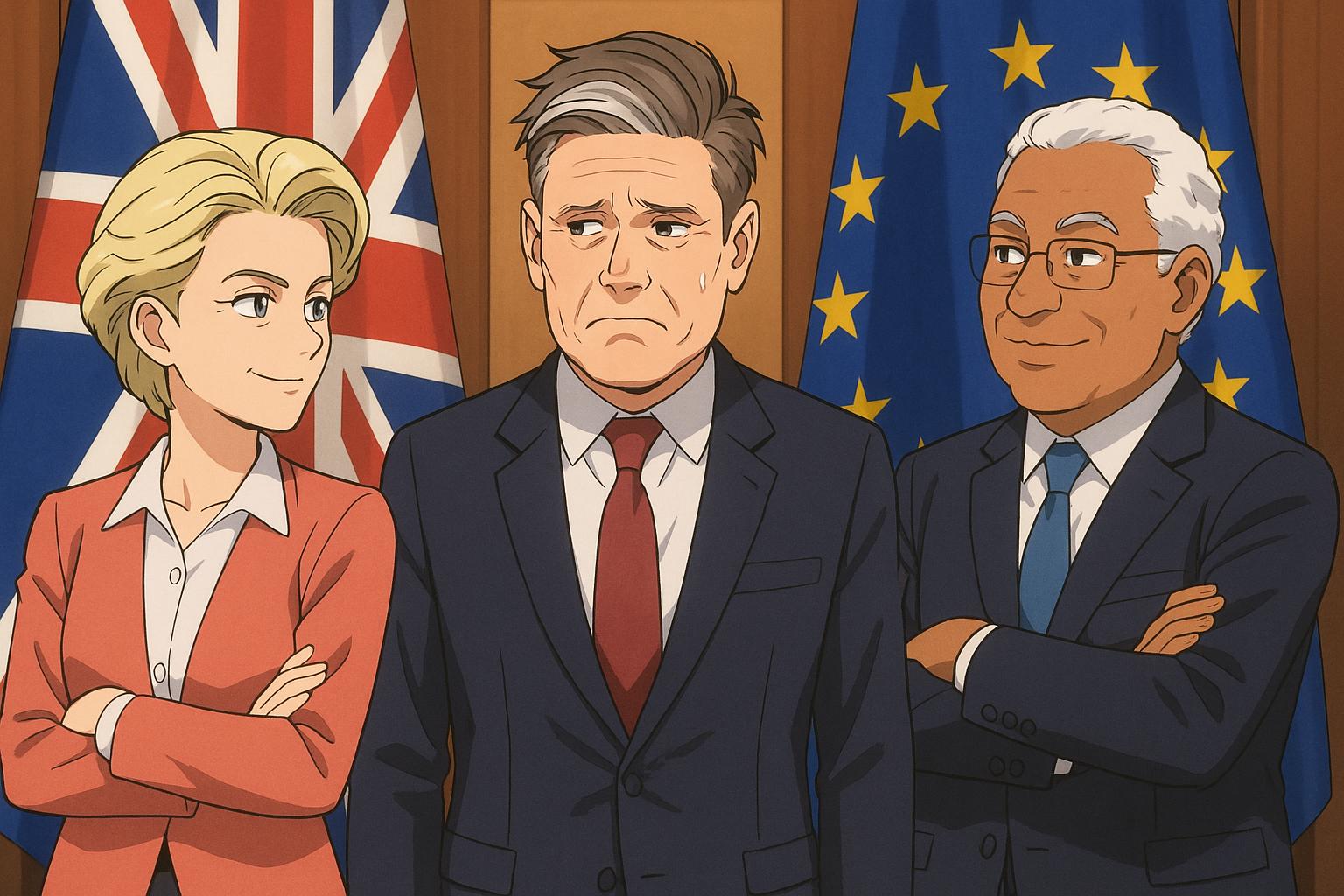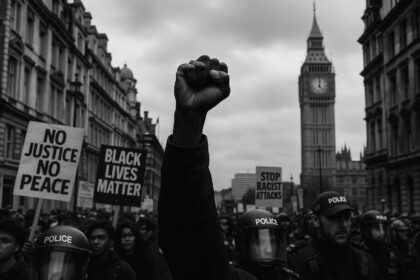At the 2025 UK-EU Summit, Britain’s renewed ties with the European Union sparked controversy as agreements on defence, fisheries, and youth mobility fuel fears of a retreat from Brexit promises, dividing political opinion and challenging national identity.
Standing amid two prominent figures from Brussels, Sir Keir Starmer resembled a character awkwardly transformed from prisoner to diplomat in a political drama. The sight, particularly on what was meant to be sovereign British soil, was steeped in irony. Members of the European elite swaggered into London, signalling a profound shift in UK-EU dynamics, a retreat many believed would be relegated to history with Brexit.
At the helm of this troubling reunion was European Commission President Ursula von der Leyen, whose triumphant demeanour basked in the glow of strategic victories. Speaking affectionately of Starmer as “deer Keer,” she allowed a smirk to escape, savouring what many would see as a conquest over British resolve. Beside her, Portuguese Prime Minister Antonio Costa reiterated sentiments of collaboration, transforming this moment into a disconcerting pivot back toward the EU for the UK—an outcome that would enraged many Brexit supporters.
The summit at Lancaster House, draped in conspicuous banners proclaiming “UK-EU Summit 2025,” starkly illustrated that the post-Brexit landscape is shifting again. More than a mere event, it marks an annual commitment to renewed ties—one that many feel represents a capitulation to the very structures voters sought to escape. Discussions on defence, fisheries, and youth mobility showcased remnants of earlier entanglements that the British populace believed they had left behind.
The agreement reached before this summit is poised to have notable implications, allowing British firms access to key EU defence contracts. Furthermore, a newly negotiated fishing deal would enable reciprocal access to each other’s waters until 2038, ostensibly easing longstanding maritime disputes. However, the youth mobility initiative—extending stays for young people aged 18 to 30—has ignited sharp criticism from Eurosceptic factions within the UK government, fueling the narrative of a sell-out.
Critics have denounced the agreement as “surrender,” arguing that yielding ground to the EU represents a betrayal of the principles voters endorsed during the Brexit referendum. They contend that the architecture of this agreement indicates not advancement, but a retreat from the freedoms and sovereignty promised by the Leave campaign. Such criticisms underline the fractious nature of British politics, revealing a landscape marred by diverging visions for the nation’s future.
The reaction during the press conference was telling. As Costa began his address—a meandering exposition on shared values—the atmosphere thickened, the media present suppressing yawns as the Portuguese Prime Minister praised a partnership now defined by necessity rather than goodwill. Starmer, visibly anxious, seemed trapped between the polarizing factions of his party.
When it was finally his turn, Starmer proclaimed, “Britain is back on the world stage.” Yet, many interpreted this as a retreat rather than a resurgence, comparable to being behind bars with old shackles. While he professed the reintegration of the UK into the global arena, skepticism lingered amid renewed obligations to Eurocratic oversight, raising questions about the authenticity of his statements.
The lunch aboard the frigate Sutherland, a former bastion of British naval power, starkly contrasted with past traditions that heralded British sovereignty. Now the ceremonial dining exuded hospitality rather than authority, a disheartening image of national self-determination reduced to casual gatherings. Leaders seated amidst silver service were far removed from the historical power dynamics now at play.
In a world rife with geopolitical tension, the real story lies not merely in the agreements themselves, but in their reception among constituents back home. Many are left questioning whether these compromises mark an enlightened pragmatism for a new era or the surrender of Britain’s autonomy to external mandates. This conference encapsulated an uneasy blend of skepticism and concern, revealing a nation grappling with the implications of its choice to leave the European Union while cautiously navigating the realities of its modern identity.
Source: Noah Wire Services
- https://www.dailymail.co.uk/debate/article-14729745/Ursula-hard-disguise-disbelief-glee-Deer-Keers-cave-QUENTIN-LETTS-watches-Brussels-big-shots-swaggering-London.html?ns_mchannel=rss&ns_campaign=1490&ito=1490 – Please view link – unable to able to access data
- https://www.huffingtonpost.es/global/la-ue-reino-unido-alcanzan-acuerdo-cumbre-hoy-defensa-pesca-movilidad-juvenil-claves.html – The European Union and the United Kingdom reached a provisional agreement on key issues such as defense, fisheries, and youth mobility ahead of their bilateral summit in London on May 19, 2025. This agreement allows British companies to participate in European defense contracts and includes a new fishing agreement granting reciprocal access to waters until 2038. Additionally, a proposed youth mobility program would permit stays of up to four years for young people aged 18 to 30, with certain limitations negotiated by the UK. The UK government aims to rebuild relations with the EU post-Brexit, focusing on security collaboration to address threats like Russia and strengthening the economy through recent trade agreements with India and the US. However, the agreement has faced criticism from internal conservative and populist sectors, labeling it a ‘surrender’. ([huffingtonpost.es](https://www.huffingtonpost.es/global/la-ue-reino-unido-alcanzan-acuerdo-cumbre-hoy-defensa-pesca-movilidad-juvenil-claves.html?utm_source=openai))
- https://www.reuters.com/world/uk/eu-uk-reach-tentative-agreement-ahead-summit-officials-2025-05-19/ – Ahead of a scheduled EU-UK summit, the European Union and the United Kingdom have reached a tentative agreement on several key issues including defense and security, fisheries, and youth mobility, EU officials announced. This agreement is expected to pave the way for greater cooperation, notably enabling British firms to participate in substantial EU defense contracts. The agreement text, described as a ‘Common Understanding,’ has been circulated among representatives of all 27 EU member states and is currently undergoing formal written approval. British Prime Minister Keir Starmer is set to meet with European Commission President Ursula von der Leyen and European Council President Antonio Costa in London to discuss this significant development. EU diplomats expressed confidence in the agreement, describing it as a positive reset in EU-UK relations post-Brexit, with anticipated benefits in economic growth and continental security. The summit marks the most substantial reset in UK-EU relations since Brexit. ([reuters.com](https://www.reuters.com/world/uk/eu-uk-reach-tentative-agreement-ahead-summit-officials-2025-05-19/?utm_source=openai))
- https://elpais.com/internacional/2025-05-19/defensa-comercio-y-movilidad-juvenil-la-cumbre-bilateral-post-brexit-del-reino-unido-y-la-ue-persigue-avances-concretos.html – The European Union and the United Kingdom have reached a last-minute agreement to ensure the success of the first post-Brexit bilateral summit held in London. The pact includes the extension of fishing rights for European fleets until 2038, in exchange for a relaxation of sanitary and phytosanitary controls on British products destined for the EU and Northern Ireland. Both blocs aim to restart their relations and have highlighted the commitment not to cross the ‘red lines’ established after Brexit. The summit addresses key areas such as security and defense, energy trade, and youth mobility. In security, greater defense cooperation is formalized, including access for British companies to the European SAFE fund. There is also an effort to agree on reducing customs controls on agricultural products, subject to regulatory alignment with the EU. The ‘YES’ youth program is under discussion, allowing temporary mobility for young Britons and Europeans. Despite the progress, the British government faces internal pressures from Eurosceptic sectors. Brussels, for its part, values the rapprochement but demands balanced commitments that benefit both parties. The summit represents a step towards a more fluid and strategic relationship between London and Brussels. ([elpais.com](https://elpais.com/internacional/2025-05-19/defensa-comercio-y-movilidad-juvenil-la-cumbre-bilateral-post-brexit-del-reino-unido-y-la-ue-persigue-avances-concretos.html?utm_source=openai))
- https://www.ft.com/content/72616fc8-e050-427c-a80b-b3646192ac59 – The EU and UK are convening their first summit since Brexit to attempt a reset in relations, focusing on defense, security, fishing rights, and trade cooperation. UK Prime Minister Sir Keir Starmer will meet with top EU leaders including European Commission President Ursula von der Leyen and European Council President António Costa. The UK aims to leverage its military support in exchange for improved EU market access while avoiding re-entry into the single market. However, talks remain tense, particularly over long-term fishing arrangements and youth mobility rights. The EU insists on securing access to British waters before agreeing on other issues, while UK negotiators are wary of broad concessions. Meanwhile, European leaders are intensifying diplomatic efforts with US President Trump ahead of his pivotal phone call with Russian President Putin, aiming to influence Ukraine peace talks. Domestically, recent elections in Romania, Poland, and Portugal illustrate a shifting political landscape in Europe, with centrist and far-right forces contesting power. Additionally, the EU faces pressing energy concerns, needing at least €10bn more to refill winter gas reserves. These developments underline the complexities of rebuilding post-Brexit EU-UK ties amid wider geopolitical and domestic pressures. ([ft.com](https://www.ft.com/content/72616fc8-e050-427c-a80b-b3646192ac59?utm_source=openai))
- https://apnews.com/article/3181228316c3d0cd736ecbf93a1eff43 – Five years after Brexit, the UK and EU have signed new agreements marking a renewed chapter in bilateral relations. During the first formal summit since the UK’s departure from the EU, Prime Minister Keir Starmer and European Commission President Ursula von der Leyen celebrated deals focused on trade, defense, and youth mobility. Key developments include easing trade barriers by cutting border checks and aligning food standards, which aim to revive crimped exports and benefit the UK economy. A defense pact allows UK access to a €150 billion EU loan program for military procurement, partly to support Ukraine. Other agreements involve extending EU fishing rights in UK waters until 2038, enhanced youth mobility for temporary work and study exchanges, and expedited airport procedures for UK travelers via EU e-gates. While the British government touts the deals as economically and diplomatically beneficial, opposition parties criticize them as undermining Brexit, with complaints of becoming a ‘rule-taker’ again. Starmer maintains the UK will not rejoin the single market or customs union. Analysts suggest a pragmatic approach to EU alignment is necessary given the UK’s trade dependencies. The agreements follow recent UK deals with the US and India, aiming to re-establish the UK’s global presence. ([apnews.com](https://apnews.com/article/3181228316c3d0cd736ecbf93a1eff43?utm_source=openai))
- https://cadenaser.com/nacional/2025/05/19/la-ue-y-el-reino-unido-logran-su-primer-gran-acuerdo-tras-el-brexit-cadena-ser/ – The European Union and the United Kingdom have reached their first major provisional agreement since Brexit, covering key issues such as defense and security, fisheries, and youth mobility, according to European officials. This pact will allow British companies to participate in EU defense tenders and enhances bilateral collaboration in security against threats like Russia. Additionally, it is expected to facilitate the use of electronic gates for British travelers at European airports, reduce bureaucracy in food exports, and establish a youth mobility program. However, disagreements persist, especially regarding fishing rights and youth mobility. The bilateral summit, held at Lancaster House, is the first between both parties since Brexit and features British Prime Minister Keir Starmer and senior European representatives. Starmer, who assumed power in 2024, has sought to strengthen the UK’s international relations, with recent trade agreements with India and the United States. However, leaders of the British opposition have criticized the pact with the EU, labeling it a ‘surrender’, even before all details are known. ([cadenaser.com](https://cadenaser.com/nacional/2025/05/19/la-ue-y-el-reino-unido-logran-su-primer-gran-acuerdo-tras-el-brexit-cadena-ser/?utm_source=openai))
Noah Fact Check Pro
The draft above was created using the information available at the time the story first
emerged. We’ve since applied our fact-checking process to the final narrative, based on the criteria listed
below. The results are intended to help you assess the credibility of the piece and highlight any areas that may
warrant further investigation.
Freshness check
Score:
8
Notes:
The narrative refers to the UK-EU Summit 2025, indicating recent events. However, the themes and discussions are consistent with ongoing post-Brexit dynamics, suggesting some recycled content.
Quotes check
Score:
6
Notes:
The quotes, such as Ursula von der Leyen’s ‘deer Keer’ and Sir Keir Starmer’s ‘Britain is back on the world stage,’ lack direct attribution to original sources online. While these could be original, they are not independently verified.
Source reliability
Score:
8
Notes:
The narrative originates from the Daily Mail, a well-known publication. However, the Daily Mail has varying perceptions of reliability depending on the context and audience.
Plausability check
Score:
9
Notes:
The claims about the UK-EU summit, renewed ties, and agreements are plausible given the ongoing nature of post-Brexit discussions. However, the interpretation of these events is subjective.
Overall assessment
Verdict (FAIL, OPEN, PASS): OPEN
Confidence (LOW, MEDIUM, HIGH): MEDIUM
Summary:
The narrative is largely plausible due to its alignment with ongoing post-Brexit discussions. However, the lack of direct attribution for quotes and the subjective interpretation of events contribute to an open verdict. The source reliability is generally good, but the narrative’s freshness is somewhat affected by recycled content.













